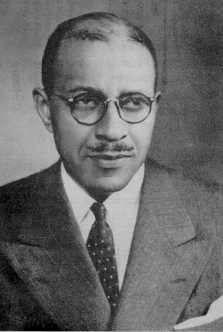 completed the
doctoral degree in 1917 at the University of Chicago. While a student in
Chicago, Johnson assumed responsibility as director of research and investigation
for the Chicago Urban League. During World War One, he enlisted in the
army and served in France.
completed the
doctoral degree in 1917 at the University of Chicago. While a student in
Chicago, Johnson assumed responsibility as director of research and investigation
for the Chicago Urban League. During World War One, he enlisted in the
army and served in France.
Johnson returned to Chicago after the war, one week before the race riot of 1919. He completed a study and analysis of the race riot and presented a plan to study its causes. The governor accepted his plan and appointed Johnson as associate executive secretary of Chicago's Commission on Race Relations. The commission published a report entitled, The Negro in Chicago. In 1921, Johnson became the director of research for the National Urban League in New York, where he founded and edited Opportunity: A Journal of Negro Life, a periodical designed to stimulate pride in past racial achievements and to show there was hope for the black future.
Charles S. Johnson came to Fisk University in 1927 to head the department of social research, which was established by a gift from the Laura Spelman Rockefeller Memorial. As head, Johnson created a first-class department and received large grants from foundations. He devoted his life, research, writing, and teaching to explaining blacks to whites, whites to blacks, southerners to northerners, and urban and rural dwellers to one another. His scholarly ability was recognized by awards and appointments, including the 1930 William E. Harmon Gold Medal for distinguished achievement among blacks in the field of science and service on the National Housing Commission under President Herbert Hoover and on the U. S. Committee on Farm Tenancy under President Franklin D. Roosevelt. In 1934, he was elected the first black trustee of the Julius Rosenwald Fund and became the first black accorded the honor of being elected vice-president in 1937 of the American Sociological Society.
Johnson helped Fisk become a center for research in race relations. When the university created the Institute of Race Relations in 1944, Johnson was chosen to head the unit. He gathered distinguished scholars at Fisk, including E. Franklin Frazier, Horace Mann Bond, Bertram Doyle, Paul K. Edwards, and Robert E. Park.
In October 1946, the board of trustees chose Charles S. Johnson as the university' first black president. Their selection was inspired by Johnson's capabilities not his race. Johnson was an internationally recognized scholar with seventeen books, chapters in fourteen others, seventy-two articles, and many book reviews. He had served as editor of three magazines. Under his presidency, the university enlarged its student body and the endowment. Charles S. Johnson died in 1956 and was interred in Nashville's Greenwood Cemetery.